The new learning method under the School-Based Assessment (PBS) to replace the Form Three Assessment (PT3) is seen as more inclusive and comprehensive in evaluating the true potential of students at the school level to build a new and better generation.
Education deputy director-general (Policy and Co-curriculum) Pkharuddin Ghazali said the assessment through three components, schoolroom assessment (PBD), physical, sports and co-curriculum activities assessment (PAKSK) and psychometric assessment (PPsi) was capable of providing an accurate indication of a student’s achievements and weaknesses.
He said that the three-component assessment through continuous learning (formative) and final year exams can enable teachers and parents to take intervention measures to strengthen students’ achievements.
“Teachers will provide reviews and assessments based on students’ efforts and achievements in a subject. It will be collected by the class teacher and turned into a report for teachers and parents. The same with PAJSK, from involvement in sports, co-curriculum, and competitions, all will be evaluated and graded.
“Every student will be given an authentic assessment report. So parents will know if their children have mastered what subject, what their skills are and what needs improvement, the same with the student’s educator at the next level,” he said while commenting on the Ruang Bicara programme entitled “The 2022 School-Based Assessment Improvements” on Bernama TV last night.
Senior Education Minister Mohd Radzi Md Jidin recently announced that the PT3 examination introduced in 2014 would be abolished this year. The PT3 exam was not implemented in 2020 and 2021 following the Covid-19 pandemic.
Pkharuddin said the effort was also to improve the country’s education system to a higher quality level with new standards through the implementation of a Question Bank by the Education Ministry that will gather quality questions from teachers around the country.
Preparations
On the ministry’s preparations to face new changes in the education system, he said assessment manuals for teachers and readiness at structural levels have been implemented.
“In terms of structure, we have co-curriculum officers, they will help teachers interpret. We have trainers to guide teachers. We also have manuals and documents. It’s true, there may be challenges but I’m sure our teachers have high capabilities.
“Our teachers can be trained and be given new capabilities. When we have seen the formative and summative assessment, I am confident parents will realise this new system and reporting will be of higher quality,” Pkharuddin added.

He also said that PBS would not only create a fun learning environment for students with an exploration approach, but had the potential to create a generation with high confidence.
Pkharuddin pointed out the education system in the developed countries like Finland, Japan, Australia and New Zealand would also focus on student character development at an early stage through exploration, inquiry and projects, to boost critical, creative and innovative thinking skills.
In April last year, Radzi announced the total abolishment of the Primary School Assessment Test (UPSR) from 2021, and to provide focus on improving PBS while admissions to full boarding schools will be based on Specific School Admission Assessment (PKSK) from 2022.
- Bernama



No comments:
Post a Comment
Note: Only a member of this blog may post a comment.